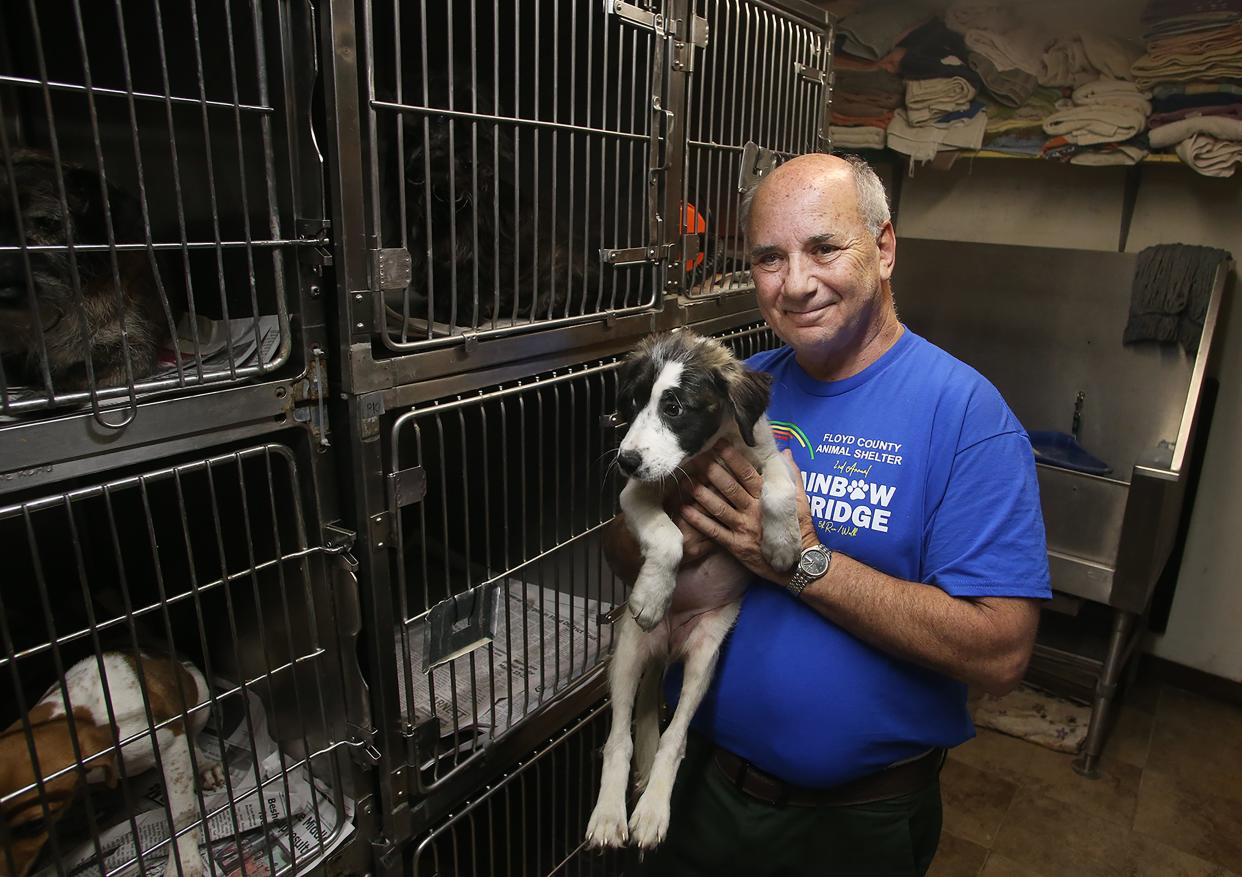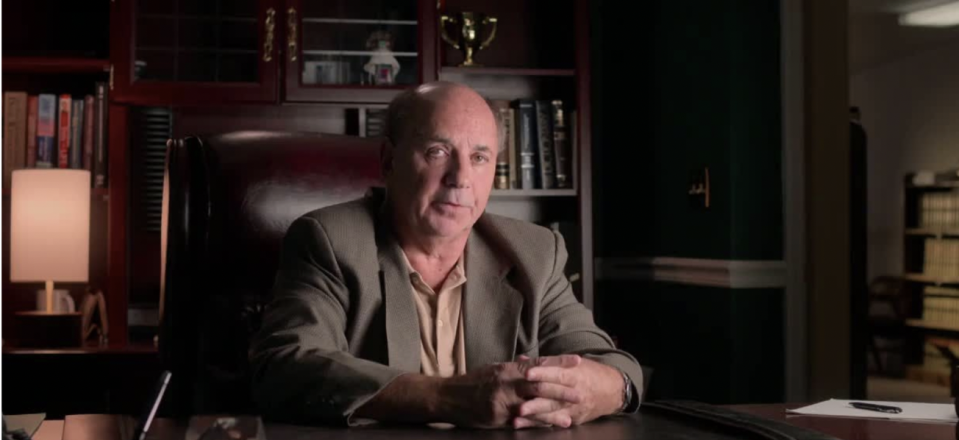Ned Pillersdorf: Abrasive but charming. Meet the man who takes on Goliaths

The arrest could not have been more embarrassing for Ned Pillersdorf’s client.
As students looked on, FBI agents and state police handcuffed teacher Nora Lee Mastin in front of Knott County Central High School, then charged her with the armed robbery of a bank They said she and her brother, her alleged accomplice, made their getaway into the mountains on all-terrain vehicles.
A federal prosecutor called her a “modern-day female Jesse James.”
But attorney Pillersdorf noticed a discrepancy between the reported heights of the suspects and the actual heights of the defendants. He hired an expert on photogrammetry — the art and science of extracting 3D information from photographs — who testified it was mathematically impossible for the brother and sister to be the robbers. Pillersdorf made an FBI agent measure them in the courtroom.
Mastin was acquitted, as was her brother, who was represented by separate counsel.
“It was a good day to be a lawyer,” Pillersdorf remembered.
Pillersdorf’s army
That was 1997. Today, Pillersdorf is best known not for his own legal prowess, but for mobilizing what The Washington Post called the largest collection of volunteer attorneys in U.S. history.
Recruited nationwide by Pillersdorf, they have represented thousands of Eastern Kentuckians who lost their disability benefits when disgraced attorney Eric Conn was accused — and eventually convicted — of obtaining them by fraud.
Pillersdorf insists most of the recipients were genuinely disabled and had no idea that Conn was bribing medical witnesses — his “whore doctors,” he called them — and paying off a federal judge to rubberstamp the claims.
Thanks to Pillersdorf’s army, most of Conn’s former clients have gotten their benefits back and kept them.

The Prestonsburg lawyer got to play a starring role in “The Big Conn,” an Apple TV+ documentary series about Conn, who fled the country after he was convicted of defrauding the Social Security Administration. He was eventually captured in Honduras and is now serving 27 years in prison.
For this effort, which included finding lawyers to staff 2,000 hearings and more than 250 federal district court cases, the American Bar Association has given Pillersdorf its Pro Bono Award recognizing legal work done without pay. He was one of four attorneys nationwide so honored.
Born in the Bronx
In some respects, Pillersdorf was an unlikely candidate to become an Eastern Kentucky hero.
He was born 68 years ago in the Bronx in New York City, raised mostly by his maternal grandfather, a Ukrainian immigrant, and his father, a clothing salesman.
Pillersdorf came to the mountains as a young man to work as a public defender.
But after meeting the love of his life, a “perfect coal miner’s daughter,” as he calls Janet Stumbo, he never left. He later ran eight judicial election campaigns for her, including one in which she became the first woman elected to the Kentucky Supreme Court.
Pillersdorf sought election himself in 1991, running for the Democratic for Congress in the 5th District. He finished second, with 17 percent of the vote, and never ran again.
Pillserdorf’s friends and fellow lawyers say his role in defending Conn’s victims – and taking on the Social Security Administration – came as no surprise to them. He spent his career fighting big government and big corporations, including coal companies, as well as defending outcasts and the destitute in Eastern Kentucky.
“He has often been on the side of David in David vs. Goliath battles,” says Joe Childers, a Lexington attorney who has fought some of them with him.
But not everyone is a fan.
Pikeville attorney and columnist Larry Webster calls Pillersdorf a "relentless self-promoter." Writing in the Herald Leader, Webster facetiously observed that the one good thing to come out of the Conn scandal is that it gave Pillersdorf the chance to "nominate himself for a Nobel Prize."
A first date
Pillersdorf and Stumbo met at a “Christian singles” softball game at Jenny Wiley State Park. On their first date, he took her to a New York Mets game in Cincinnati. She brought along a book, Pillersdorf remembers; “I guess she didn’t think I was much of a conversationalist."
They tried a few cases against each other when she was briefly a prosecutor. But their relationship survived and they have been married 41 years and have three adult daughters.
Pillersdorf said he was welcomed in Stumbo's native Floyd County, but treated as an outsider, at least at first, in Pike, where he said some residents deliberately mispronounced his name.
Pillersdorf embraced local causes over the years and the community embraced him, said Phillip Shepherd, a friend for 40 years and now a Franklin Circuit Court judge
Citing an obscure statute requiring every county to support an animal shelter, he and Stumbo forced Floyd County to fund one which they dubbed the “Dewey Dam Dog and Cat Protection Society.” They still run it and are proud that 90% of the pets it takes in are adopted.

Boycott proposed
Pillersdorf also ran The David School, a private school for impoverished Appalachian students in Eastern Kentucky, as board chairman and volunteer boy’s basketball coach.
It was in the latter role when his team, which had one Black member, voted unanimously in 2006 to boycott a game against the Allen Central High School Rebels because its fans waved Confederate flags at games.
Pillersdorf, unapologetically progressive, said that was a form of taunting and the proposed boycott captured national attention.
The game eventually was played in a closed gym with no flags and no fans. Pillersdorf who was in a federal trial in Lexington, had to ask his wife to coach the team, got crushed − though by no bigger margin than when he coached it, he said.
A series of acquittals
As a young lawyer, he won renown for a series of acquittals.
From 1981 to 1989, Pillersdorf represented 20 defendants accused of capital crimes, The Courier Journal reported, but none of them received the death penalty.
In what was probably Pillersdorf’s great triumph, he won an acquittal in 1984 for Clyde Douglas Marshall, who was charged with complicity to murder for hiring several men to kill his wife to collect on her life insurance policy. His exoneration was considered extraordinary because one of the men, his own brother, Bobby McGuffey, pleaded guilty and agreed to testify for the prosecution. McGuffey is still in prison serving that sentence.
Pillersdorf said he was in such demand after that verdict that he left his $16,000-a-year public defender job behind and went into private practice.
He also tried civil cases, including about 10 suits he filed to try and end what he called the “nauseating practice,” once common in rural counties, in which elected county leaders fire county workers who didn’t support their re-election campaigns.
And 24 years before Kentucky lawmakers voted to legalize medical marijuana, he defended 31-year-old truck driver Rck Morris, who had a tumor wrapped around his brain stem – and was busted in his home with seven ounces of weed. Pillersorf argued Morris would starve to death if he didn’t smoke it to counteract his nausea from chemotherapy. He was convicted but Pillersdorf persuaded a jury to fine him only $1.
When the court ordered the seized marijuana destroyed, Pillersdorf outrageously − but unsuccessfully − moved to let his client destroy the cannabis by smoking it.
In 2000, when the Perry County Sheriff’s office enticed well-liked Perry County Attorney John Mark Barger to meet an informant for sex in a motel room, then induced him to participate in a fabricated drug trafficking scheme, Pillersdorf denounced the sheriff as a “pimp." Barger was only convicted of simple possession, a conviction that was thrown out on appeal.
In 2001, the Kentucky Association of Criminal Defense Lawyers named him its attorney of the year.
Defense lawyers and prosecutors, including former Assistant U.S. Attorney Tom Self, whom he beat in the Mastin bank robbery trial, said he is successful because jurors find him likable.
Childers likened him to Columbo, the disheveled TV detective. “With his shirt tail out and his tie loose and his hair a mess, he had jurors eating out of his hand,” the Lexington attorney remembered of a case they tried together.
Stumbo, his wife, said he is “very good at appealing to emotion.”
“He can be abrasive and obnoxious,” said Shepherd, the judge, who tried cases with him. “But he also can be charming. And he has a very good heart.”
Leading the charge for Conn's victims
Pillersdorf had never handled a disability case when he got the call in June 2015 telling him that Leroy Burchett, a former client, had killed himself June 1, 2015, after learning the government was going to take away his benefits because of Conn’s fraud.
Then state police stopped by Pillersdorf's office and told him a woman on the way to see him had pulled to the side of the road and shot herself in the head.
A friend of Pillersdorf, a Lexington psychiatrist, warned him there would be more suicides if Conn’s former clients felt abandoned.
Pillersdorf sprang into action. He created a Facebook page to keep Conn’s former clients informed, “even though I hate Facebook.”
The Floyd County Bar Association convened an emergency meeting and Pillersdorf filed a lawsuit alleging the Social Security Administration had unconstitutionally suspended benefits to 900 ex-Conn clients.
So began eight years of advocacy and arm-twisting by Pillersdorf.
Why did he feel obligated to jump into the fray, with no prospect of making money off of it?
“Hundreds of my vulnerable friends and innocent neighbors here in the mountains were swept up in the Conn debacle,” he said.
John Rosenberg, director emeritus of AppalReD Legal Aid, which also pitched in to help., said Pillersdorf was furious at both Conn and the Social Security Administration, which he publicly called out as "heartless."
“I couldn’t believe our government could be so cruel to the least among us,” Pillersdorf said.
The first relief came in just a few days, when U.S. Rep. Hal Rogers called Pillersdorf at home to ask what he could do about the mounting suicides.
Rogers intervened with the Social Security Admiration and persuaded it to temporarily restore benefits. But the agency said that 1,700 people would have to prove again that they were genuinely disabled 10 or even 15 years earlier, often without any access to their old medical records, some of which Conn’s staff burned in a four-daylong bonfire behind his office.
'Ned is very persuasive'
The ones who appeared without counsel for so-called re-determination hearings were like lambs led to slaughter.
But there were not enough knowledgeable lawyers in Kentucky to represent them.
Pillersdorf realized he and others would have to search far and wide for volunteers familiar with the arcane field of disability law.
Ann Atkinson, a social security lawyer from Parker, Colorado, who hadn't ever been to Kentucky when Pillersdorf asked her to join the crusade, has now been to the start several times for hearings.
“Ned is very persuasive,” she said. Other volunteer attorneys came from as far as Oregon and Washington. Louisville lawyer Bob Ewald had been retired for six years when he signed up. And when the supply of attorneys was exhausted, Pillersdorf and Rosenberg persuaded law schools at Notre Dame and University of Kentucky to send students to the mountains.
Pillersdorf personally handed about 100 re-determination hearings, including 15 in May. He won about 60%, he said.
He also litigated on behalf of Conn’s former clients in multiple federal courts. He won a ruling from then-U.S. District Judge Amul Thapar, for example, that the agency had violated the rights of Amy Hicks and other claimants by unilaterally barring all evidence Conn presented that they were disabled. Thapar famously said that she and other were afforded less rights by the government than it gave to al Qaeda terrorists.
Then in December 2022, Pillersdorf and other lawyers negotiated a class-action settlement with the agency on behalf of the “Forgotten 500” who had gone without benefits for years and whom SSA claimed had defaulted on their right to appeal.
“I don’t know what the people of Eastern Kentucky would have done if they didn’t have someone like Ned Pillersdorf,” said Robert Martin, 60, a former truck driver disabled by a back injury and colon cancer.
“If not for him, more would have killed themselves,” Martin said. "He has saved lives. He is a good person.”
"The Big Conn," a docu-series about Eric Conn, is streaming on Apple TV+ A companion podcast is available here: https://podcasts.apple.com/us/podcast/the-big-conn-the-official-podcast/id1621583098
This article originally appeared on Louisville Courier Journal: Attorney Ned Pillersdorf makes a name for himself in Eastern Kentucky

